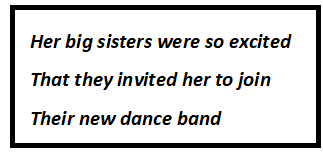Hi Everyone!! This article will share Drum Dream Girl Questions & Answers.
This poem is written by Margarita Engle. In my previous posts, I have shared the questions and answers of An Eventful Summer, On Killing A Tree and An Entrepreneur With A Heart so, you can check these posts as well.
Drum Dream Girl Questions & Answers
Word Galaxy
- Conga – narrow, tall single-handed drum
- Bongo drums – a pair of small drums that you play with your hands
- Timbales – shallow single-handed drums with metal casing
Question 1: Choose the correct option:
(a) The poet compares the brightness of the timbales to the
i. silvery moon
ii. glowing sun
iii. deep, blue sea
(b) In the island of music, men played drums in
i. dark dens
ii. outdoor cafes that looked like gardens
iii. in parks with palm trees
(c) The drum dream girl’s sisters had formed
i. an all-girl drum band
ii. an all-girl music band
iii. an all-girl dance band
(d) The drum dream girl’s consistent drumming and dreaming forced her father to
i. confine her at home
ii. send her to dance school
iii. find a music teacher for her
(e) The poem tells us that
i. one’s gender is not an obstacle to one’s dreams
ii. women make better drummers
iii. the island of music is a beautiful place
Question 2: What did the drum dream girl dream of?
Answer: The drum dream girl dreamt of playing drums.
Question 3: Describe her passion for her dream as portrayed by the poet.
Answer: The drum dream girl was so passionate about playing drums that she played everywhere, on the table, on the chairs and in her head.
Question 4: What do you think her ‘imaginary music’ was?
Answer: Her ‘imaginary music’ was when she would play the drums in the same cafes that looked like gardens.
Question 5: What would she constantly do even though she was forbidden from doing it at home?
Answer: Even though she was told that only boys were allowed to play the drums, she kept drumming and dreaming alone.
Question 6: Why was her teacher amazed?
Answer: Her teacher was amazed because the drum dream girl knew very well to play the drum.
Question 7: What did the teacher finally allow her to do?
Answer: The teacher finally allowed her to play the small bongo drums outdoors at a starlit café that looked like a garden.
Question 8: This poem inspires us to challenge stereotypes and change them.’ Justify the statement with reference to the poem.
Answer: The poem shows us that Millo Castro Zaldarriaga challenged the stereotype that only boys were allowed to play the drums in Cuba. In doing so, she has inspired us to challenge stereotypes of what boys or girls can do.
Question 9: Read and answer the questions:
At carnivals, she listened to the rattling beat.
(a) What did she listen to the beat of?
Answer: She listened to the beat of towering dancers on stilts.
(b) Who else performed at the carnival?
Answer: Costumed drummers wearing huge masks also performed at the carnival.
(c) What did she want to do?
Answer: She wanted to play the drums.
(d) Describe the word ‘rattling’ as used by the poet.
Answer: The word ‘rattling’ means making a series of knocking sound, the sound of the drumbeats.
Question 10: Read and answer the questions:

(a) Why were her big sisters so excited?
Answer: Her big sisters were so excited by seeing her performance of playing the drums.
(b) Was she allowed to join the band? Give reasons.
Answer: No, she was stopped by her father telling that only boys should play the drums.
(c) How did things change thereafter?
Answer: The girl kept on dreaming and finally, her father had to bring a music teacher who would decide if her drums deserved to be heard. She practiced and practiced and she was allowed to play the small bongo drums.
(d) Do you think that this change was quite common in that society? Explain.
Answer: No, the society was sticking on their traditional practice of playing the drums by the boys only. But this little girl could change their attitude. So, it was something very uncommon in that society. Her father made an exception for her seeing her passion for drums.
So, these were Drum Dream Girl Questions & Answers.